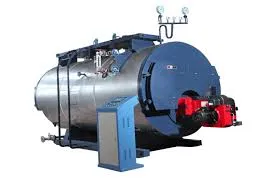
មីនា . 06, 2025 11:48 Back to list
steam boiler corrosion
Steam boiler corrosion is a critical concern in industrial applications, impacting efficiency, safety, and the lifespan of the equipment. Understanding the causes and implementing preventive measures are essential to mitigate risks and maintain optimal boiler performance.
Implementing a rigorous maintenance routine is essential to identify early signs of corrosion and address them promptly. Routine inspections, including non-destructive testing methods such as ultrasound or radiography, help detect internal damage before it manifests visibly. Early detection through regular maintenance allows for targeted repairs, preventing minor issues from escalating into costly damage. Advanced coatings and materials can provide an additional layer of protection against corrosion. Epoxy coatings or specialized alloys with increased resistance to chemical degradation offer enhanced durability in corrosive environments. Selecting the appropriate materials based on the boiler's operating conditions and the nature of the substances involved is crucial for long-term performance. Operational modifications can also play a vital role in reducing the risk of corrosion. Controlling the boiler's temperature and pressure within optimal ranges minimizes stress on components, reducing the likelihood of corrosion-related failures. Additionally, ensuring consistent fuel quality and using additives to stabilize combustion can mitigate the formation of corrosive byproducts. Training and educating personnel on the causes and prevention of steam boiler corrosion foster a culture of preventative maintenance. Operators and maintenance staff equipped with the knowledge to identify potential issues and respond effectively contribute to the longevity and reliability of boiler systems. In summary, steam boiler corrosion is a multifaceted challenge requiring a comprehensive approach encompassing chemical treatments, material selection, maintenance strategies, and personnel training. Through a combination of these measures, industries can significantly extend the lifespan of their steam boilers, optimize performance, and maintain safe operations. Emphasizing a proactive approach to corrosion prevention ensures the sustainable and efficient use of boiler technology, ultimately contributing to the economic and environmental goals of industrial operations.


Implementing a rigorous maintenance routine is essential to identify early signs of corrosion and address them promptly. Routine inspections, including non-destructive testing methods such as ultrasound or radiography, help detect internal damage before it manifests visibly. Early detection through regular maintenance allows for targeted repairs, preventing minor issues from escalating into costly damage. Advanced coatings and materials can provide an additional layer of protection against corrosion. Epoxy coatings or specialized alloys with increased resistance to chemical degradation offer enhanced durability in corrosive environments. Selecting the appropriate materials based on the boiler's operating conditions and the nature of the substances involved is crucial for long-term performance. Operational modifications can also play a vital role in reducing the risk of corrosion. Controlling the boiler's temperature and pressure within optimal ranges minimizes stress on components, reducing the likelihood of corrosion-related failures. Additionally, ensuring consistent fuel quality and using additives to stabilize combustion can mitigate the formation of corrosive byproducts. Training and educating personnel on the causes and prevention of steam boiler corrosion foster a culture of preventative maintenance. Operators and maintenance staff equipped with the knowledge to identify potential issues and respond effectively contribute to the longevity and reliability of boiler systems. In summary, steam boiler corrosion is a multifaceted challenge requiring a comprehensive approach encompassing chemical treatments, material selection, maintenance strategies, and personnel training. Through a combination of these measures, industries can significantly extend the lifespan of their steam boilers, optimize performance, and maintain safe operations. Emphasizing a proactive approach to corrosion prevention ensures the sustainable and efficient use of boiler technology, ultimately contributing to the economic and environmental goals of industrial operations.
Share
Prev:
Latest News
-
Coal Fired Thermal Oil Boiler with GPT-4 Turbo Efficiency
NewsAug.03,2025
-
Commercial Steam Boilers for Sale - AI Optimized Efficiency
NewsAug.02,2025
-
Efficient Biomass Fired Hot Water Boiler | AI Heating Solution
NewsAug.01,2025
-
High-Efficiency Gas Thermal Oil Boilers | HPT Models
NewsJul.31,2025
-
Oil Fired Hot Water Boilers Sale - High Efficiency & Affordable
NewsJul.31,2025
-
High-Efficiency Commercial Oil Fired Steam Boiler for Industry
NewsJul.30,2025
Related PRODUCTS
Copyright © 2025 HEBEI HONGZE BOILER MANUFACTURING CO., LTD. All Rights Reserved. Sitemap | Privacy Policy






















